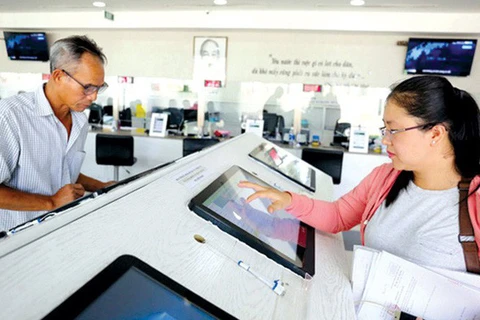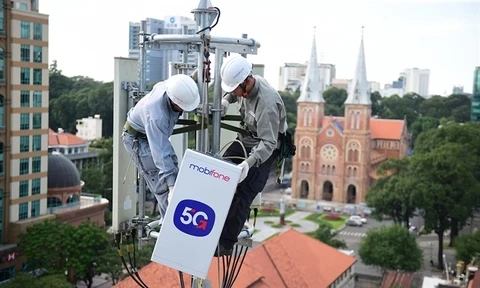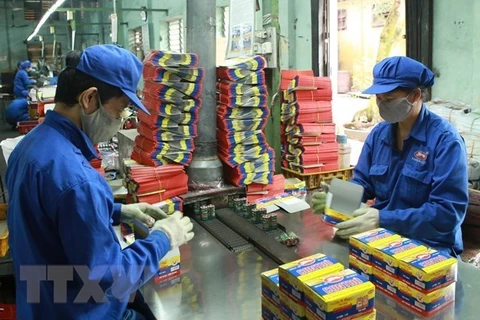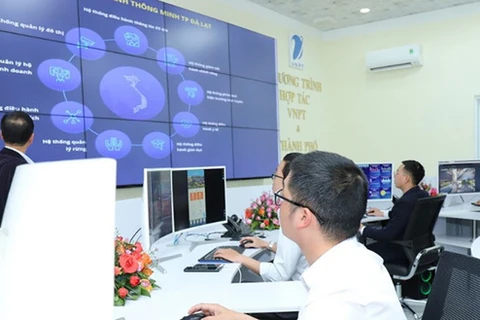Hanoi (VNS/VNA) - State-owned enterprises (SOEs) need to enhance their autonomy and responsibility under market mechanisms to contribute to the growth of the economy, according to a report by the Central Institute for Economic Management (CIEM).
Vietnam has improved the legal framework to ensure the rights of autonomy and self-responsibility of SOEs closely following international practices, but the legal framework is still missing many components, according to a recent report on the autonomy and self-responsibility under the market mechanism of SOEs conducted by CIEM with support from the Australia-Vietnam Economic Reform (Aus4reform) Programme.
The State still intervenes deeply in the operation of wholly State-owned enterprises, leading to overworked agencies that manage State capital at enterprises, while the enterprises face many difficulties.
To enhance the autonomy and self-responsibility of State-owned enterprises, the CIEM research team said improving transparency is key.
SOEs should publish public reports on both financial and non-financial information according to international standards. Strengthening financial discipline for State-owned enterprises is another important recommendation.
In addition, the transformation of an SOE into a joint-stock company is the most important measure to improve enterprise autonomy.
Phan Duc Hieu, CIEM deputy director, said the "fair treatment" of State enterprises is a requirement in a market economy, along with the implementation of commitments on international economic integration.
During 35 years of reform, Vietnamese laws have been amended so that State enterprises are increasingly empowered with more autonomy and responsibility.
According to Pham Duc Trung, Head of the CIEM's Department of Enterprise Reform and Development Research, the Enterprise Law stipulates that a State-owned enterprise has the same rights and obligations as an enterprise of all economic sectors, including business autonomy, contract, and possession, use and disposition of property.
However, institutions and management mechanisms have failed to create full autonomy and self-responsibility for State enterprises. State management agencies decide many issues in the corporate administration of SOEs. That can weaken the motivation of enterprises' leaders to act in the best interests of the enterprise and its shareholders.
Besides that, many SOEs have fallen into dissolution or bankruptcy, but are still kept alive via State support.
Le Duy Binh, CEO of Economica Vietnam, said SOEs wanted to be like private enterprises with full autonomy, but the operation of SOEs was often dependent on the State management agency that represents the owner.
Le Tien Truong, Chairman of the Vietnam National Textile and Garment Group (Vinatex), said SOEs must comply with the Law on management and use of State capital to invest in production and business.
Before approving decisions within the authority of a board of directors, the representative of State capital in the enterprise must consult the State agency that manages State capital at SOEs, then convene a meeting of the board of directors to approve those decisions for them to be executed. It can take one or two months for the State agency to respond.
When Vinatex was a wholly State-owned enterprise, it had to wait for a governing body to give it directions. The situation has continued even though Vinatex became a joint-stock company with 48 per cent of the charter capital belonging to non-State shareholders in 2015, so this process will make it difficult for the group (Vinatex), according to Truong.
"For a private company, a shareholder only votes on the company's strategic issues. Meanwhile, at an SOE, the shareholder must also vote on other normal issues. Thus, it has broken corporate governance practices," Binh said.
Nguyen Dinh Cung, former CIEM director, was quoted by the Vietnam News Agency as saying: “The State needs to create a business environment to promote and ensure State-owned enterprises operate and compete fairly according to market principles."
He said legal provisions should be revised to ensure full autonomy for State enterprises in investment and business.
In addition, there should be a legal system to improve business autonomy by fundamentally revising the Law on Management and Use of State capital to invest in production and business in enterprises.
Along with that, State agencies should not have the right to give decisions, but only give opinions and approve investment policies. In other words, the State should not decide on issues of corporate governance.
Experts have also recommended that, according to international practice on SOE governance, especially the OECD's guidance, to ensure the autonomy and self-responsibility of SOEs under market principles, the State - as the owner - needs to clearly define the reason or goal of maintaining ownership in the enterprise. The State should create conditions for the management board at the enterprises to operate autonomously and responsibly.
That means the thinking about SOEs and State management for these enterprises must change fundamentally. When operating under market principles, SOEs will play the right role in the economic recovery and growth, according to experts./.
Vietnam has improved the legal framework to ensure the rights of autonomy and self-responsibility of SOEs closely following international practices, but the legal framework is still missing many components, according to a recent report on the autonomy and self-responsibility under the market mechanism of SOEs conducted by CIEM with support from the Australia-Vietnam Economic Reform (Aus4reform) Programme.
The State still intervenes deeply in the operation of wholly State-owned enterprises, leading to overworked agencies that manage State capital at enterprises, while the enterprises face many difficulties.
To enhance the autonomy and self-responsibility of State-owned enterprises, the CIEM research team said improving transparency is key.
SOEs should publish public reports on both financial and non-financial information according to international standards. Strengthening financial discipline for State-owned enterprises is another important recommendation.
In addition, the transformation of an SOE into a joint-stock company is the most important measure to improve enterprise autonomy.
Phan Duc Hieu, CIEM deputy director, said the "fair treatment" of State enterprises is a requirement in a market economy, along with the implementation of commitments on international economic integration.
During 35 years of reform, Vietnamese laws have been amended so that State enterprises are increasingly empowered with more autonomy and responsibility.
According to Pham Duc Trung, Head of the CIEM's Department of Enterprise Reform and Development Research, the Enterprise Law stipulates that a State-owned enterprise has the same rights and obligations as an enterprise of all economic sectors, including business autonomy, contract, and possession, use and disposition of property.
However, institutions and management mechanisms have failed to create full autonomy and self-responsibility for State enterprises. State management agencies decide many issues in the corporate administration of SOEs. That can weaken the motivation of enterprises' leaders to act in the best interests of the enterprise and its shareholders.
Besides that, many SOEs have fallen into dissolution or bankruptcy, but are still kept alive via State support.
Le Duy Binh, CEO of Economica Vietnam, said SOEs wanted to be like private enterprises with full autonomy, but the operation of SOEs was often dependent on the State management agency that represents the owner.
Le Tien Truong, Chairman of the Vietnam National Textile and Garment Group (Vinatex), said SOEs must comply with the Law on management and use of State capital to invest in production and business.
Before approving decisions within the authority of a board of directors, the representative of State capital in the enterprise must consult the State agency that manages State capital at SOEs, then convene a meeting of the board of directors to approve those decisions for them to be executed. It can take one or two months for the State agency to respond.
When Vinatex was a wholly State-owned enterprise, it had to wait for a governing body to give it directions. The situation has continued even though Vinatex became a joint-stock company with 48 per cent of the charter capital belonging to non-State shareholders in 2015, so this process will make it difficult for the group (Vinatex), according to Truong.
"For a private company, a shareholder only votes on the company's strategic issues. Meanwhile, at an SOE, the shareholder must also vote on other normal issues. Thus, it has broken corporate governance practices," Binh said.
Nguyen Dinh Cung, former CIEM director, was quoted by the Vietnam News Agency as saying: “The State needs to create a business environment to promote and ensure State-owned enterprises operate and compete fairly according to market principles."
He said legal provisions should be revised to ensure full autonomy for State enterprises in investment and business.
In addition, there should be a legal system to improve business autonomy by fundamentally revising the Law on Management and Use of State capital to invest in production and business in enterprises.
Along with that, State agencies should not have the right to give decisions, but only give opinions and approve investment policies. In other words, the State should not decide on issues of corporate governance.
Experts have also recommended that, according to international practice on SOE governance, especially the OECD's guidance, to ensure the autonomy and self-responsibility of SOEs under market principles, the State - as the owner - needs to clearly define the reason or goal of maintaining ownership in the enterprise. The State should create conditions for the management board at the enterprises to operate autonomously and responsibly.
That means the thinking about SOEs and State management for these enterprises must change fundamentally. When operating under market principles, SOEs will play the right role in the economic recovery and growth, according to experts./.
VNA

























